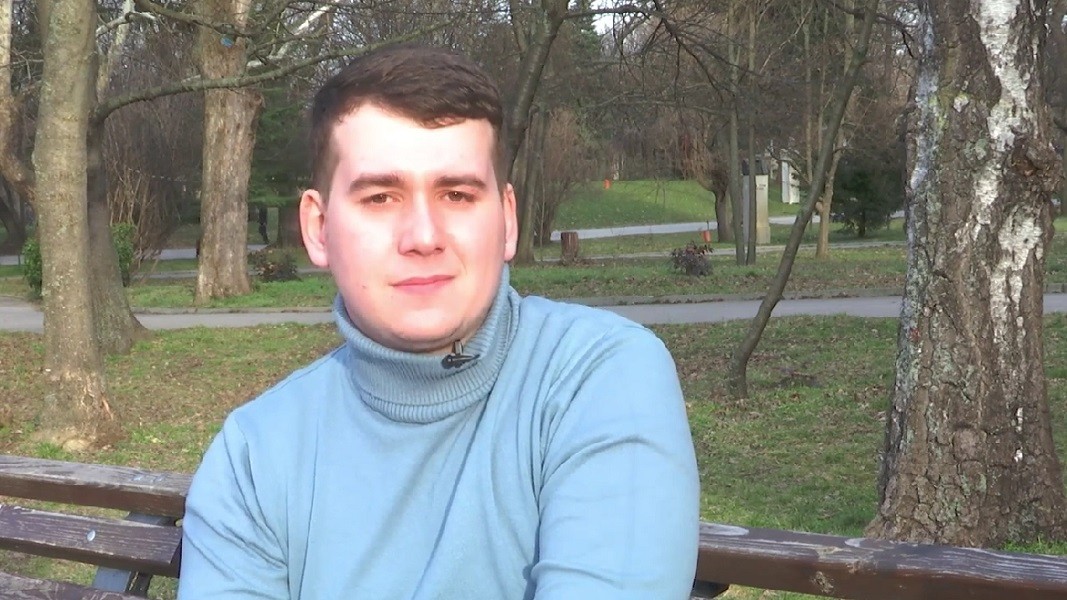The 21st century is not what we had expected it to be. We imagined a century of peace and harmony in which common sense always prevails. On February 24, however, the lives of millions of people, including that of Ruslan Matevosiuk changed beyond recognition.
“Gosh, you can only hope to never experience the feeling of war. It is horrible, says Ukraine-born Ruslan, who studies in Sofia.”
Ruslan Matevosiuk is from Berdyansk. The town is located on the northern coast of the Sea of Azov and is among the favorite summer holiday destinations for Ukrainians. Ruslan’s father is Bulgarian. That is why he decided to continue his studies in Bulgaria’s capital. Currently, his is a freshman at the University of National and World Economy, majoring in International Economic Relations.
“I arrived in Sofia on September 1, 2021. I was filled with hope, strength and optimism, because I was turning a new page in my life. I was scared in the beginning. I didn’t know what my life here would be like, and whether I would learn the language. However, I quickly got used to life in Bulgaria. I liked the busy life in Sofia. However, we switched over to online learning during the Covid-19 pandemic and I returned to Berdyansk to save money. I stayed there until February this year. I travelled back to Sofia when Russia recognized the self-proclaimed Luhansk People’s Republic and Donetsk People’s Republic. I and my family were afraid that a war would break out in Donbas, the borders would be closed and I wouldn’t be able to continue my studies in Sofia.”
Two days later Ruslan received a morning call from his mother who told him that she had heard explosions in Berdyansk and tensions were high.
“Everyone was shocked – Ruslan went on to say. – Only a few weeks ago, we were wondering where we could go for a walk or where to eat. Now, we don’t know where we can find food. Everything has changed irreversibly. People are scared. It feels horrible when you wake up to the sound of air raid sirens and when your relative is ill and cannot be admitted to hospital.”

Ruslan’s life has also changed. “When you know your parents are doing well, you can think about your own problems, but now I cannot stop thinking about them”, Ruslan said and added:
“They stay in their home and run to the bomb shelter when they hear the air raid sirens. They do not go out. Fortunately, they have enough food. All family members are still there. I lived with the illusion that all armed conflicts were a thing of the past. I don’t know what will happen next. However, sooner or later, I will return to my home town to see my relatives. ”
Ruslan has not forgotten how to smile, although he has been going through tough times. He believes that everything will be fine. He is grateful for the help and support he receives in Bulgaria and says that Bulgarian society feels positive towards all Ukrainians. “They treat us as if we were Bulgarians. Thank you!”
Ruslan is the protagonist in the first episode of Radio Bulgaria’s videocast “Time to Talk”. You can watch the whole interview on the BNR’s You Tube channel, available on the following link. You can choose the language for machine translation by clicking the button “Subtitles”.
English version: Kostadin Atanasov
Today, 2 April, on Autism Awareness Day, the Burgas Bridge will be illuminated in blue as a sign of empathy, the Municipality of Burgas announced. The day was established in 2007 by the UN General Assembly to ensure that every society creates..
April 1 was declared International Bird Day in 1906, under the International Convention for the Protection of Birds. The date symbolizes mankind's responsibility for the conservation and preservation of wildlife. Today, 119 years after its..
A new short film showcasing Bulgaria's natural beauty, resorts and leisure opportunities is set to attract tourists from China and the Middle East. Titled "Bulgaria: A Touch of Nature" and created by Stiliyan Kadrev, the 15-minuteo offers a visual..
An international conference “AI and education: The road to innovative teaching and learning” brings together 50 teachers from the Bulgarian schools..
The roof of the National High School of Applied Arts in Tryavna , a cultural landmark with almost a century of history, was destroyed in a fire early this..

+359 2 9336 661
